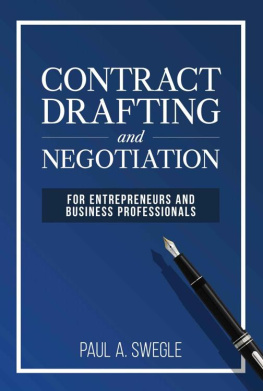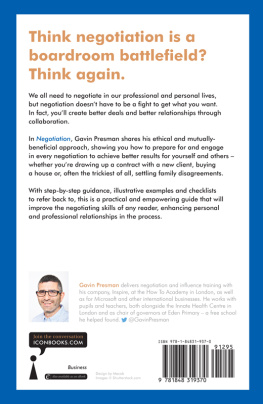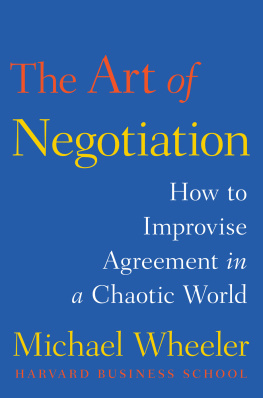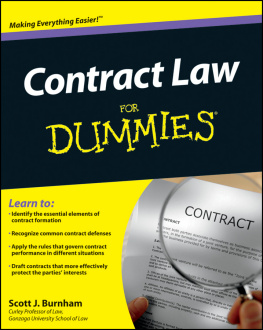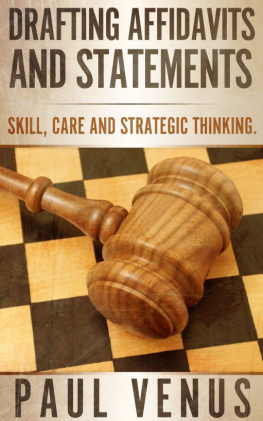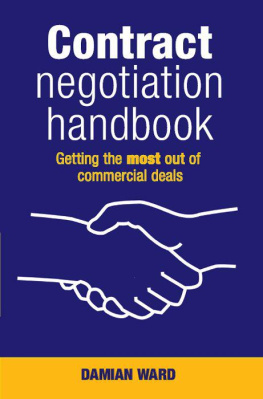Paul A. Swegle - Contract Drafting and Negotiation for Entrepreneurs and Business Professionals
Here you can read online Paul A. Swegle - Contract Drafting and Negotiation for Entrepreneurs and Business Professionals full text of the book (entire story) in english for free. Download pdf and epub, get meaning, cover and reviews about this ebook. year: 2018, publisher: Business Law Seminar Group, LLC, genre: Romance novel. Description of the work, (preface) as well as reviews are available. Best literature library LitArk.com created for fans of good reading and offers a wide selection of genres:
Romance novel
Science fiction
Adventure
Detective
Science
History
Home and family
Prose
Art
Politics
Computer
Non-fiction
Religion
Business
Children
Humor
Choose a favorite category and find really read worthwhile books. Enjoy immersion in the world of imagination, feel the emotions of the characters or learn something new for yourself, make an fascinating discovery.
- Book:Contract Drafting and Negotiation for Entrepreneurs and Business Professionals
- Author:
- Publisher:Business Law Seminar Group, LLC
- Genre:
- Year:2018
- Rating:3 / 5
- Favourites:Add to favourites
- Your mark:
- 60
- 1
- 2
- 3
- 4
- 5
Contract Drafting and Negotiation for Entrepreneurs and Business Professionals: summary, description and annotation
We offer to read an annotation, description, summary or preface (depends on what the author of the book "Contract Drafting and Negotiation for Entrepreneurs and Business Professionals" wrote himself). If you haven't found the necessary information about the book — write in the comments, we will try to find it.
Paul A. Swegle: author's other books
Who wrote Contract Drafting and Negotiation for Entrepreneurs and Business Professionals? Find out the surname, the name of the author of the book and a list of all author's works by series.
Contract Drafting and Negotiation for Entrepreneurs and Business Professionals — read online for free the complete book (whole text) full work
Below is the text of the book, divided by pages. System saving the place of the last page read, allows you to conveniently read the book "Contract Drafting and Negotiation for Entrepreneurs and Business Professionals" online for free, without having to search again every time where you left off. Put a bookmark, and you can go to the page where you finished reading at any time.
Font size:
Interval:
Bookmark:

This book is intended to provide accurate and authoritative information, but it is sold with the understanding that neither the author nor the publisher is engaged in providing legal advice or representation. If legal advice is required regarding specific facts and circumstances, the services of a qualified lawyer licensed in the appropriate jurisdiction should be retained.
Business Law Seminar Group, LLC 2018. All rights reserved.
No copyright is claimed or asserted in the excerpts of any court opinions quoted within this work. Permission to copy material exceeding fair use, 17 U.S.C. 107, may be licensed from Business Law Seminar Group, LLC at .
Library of Congress Control Number: 2018942264
eBook ASIN# - B07DM3J7B2
Paperback ISBN# - 978-0-692-13830-4
This book is dedicated to my wife Serena and to my children Matthew and Stephanie.
Thank you Serena, Kurt Zumdieck, Jim Swegle and Johanna Fuhr for the unique perspectives each of you provided in reviewing and editing my manuscript.
Contents
Chapter One
CONTRACT LAW
Chapter Two
COMMON MISTAKES
Chapter Three
NEGOTIATION
Chapter Four
DRAFTING
Chapter Five
COMMON CONTRACT TERMS
Chapter Six
IMPLEMENTATION
Chapter Seven
AMENDMENTS AND ADDENDUMS
Chapter Eight
DISPUTE RESOLUTION
Introduction
The Unforgiving Law of Contracts
In 1990, a massive floating bridge between Seattle and Mercer Island used by thousands of cars every day sank in a storm while being refurbished. The states agreement with the contractor was apparently unclear on who should pay for the sinking. After years of litigation, the contractors insurers agreed to pay $20 million without admitting responsibility.
In 2013, Bertha, the largest and most expensive drill ever built, overheated and ground to a halt under Seattle. Again it was not clear who should pay the resulting repair and delay costs, estimated at one point to be $480 million.
In 2006, the Canadian Radio-television Telecommunications Commission weighed in on a very expensive punctuation dispute between Rogers Cable Communications and Aliant Telecom. The CRTC ruled that Aliant could terminate an agreement between the two parties much sooner than Rogers believed was permitted under the following passage:
[the Structure Support Agreement] shall... continue in force for a period of five (5) years from the date it is made, and thereafter for successive five (5) year terms, unless and until terminated by one year prior notice in writing by either party.
Rogers had written the above passage intending that Aliant would not be able to terminate the agreement until after the initial five year term.
In its ruling, the CRTC found that placement of the comma before the phrase unless and until terminated by one year notice in writing by either party permitted termination of the SSA at any time, without cause, upon one year's written notice.
The CRTCs ruling allowed Aliant to terminate years earlier than Rogers had expected, apparently costing Rogers $2.4 million, all because of an errant comma.
Obviously, even professional contract negotiators and drafters miss important issues. Missteps like these happen both in government and in business. In business, cost constraints can limit access to competent legal counsel. Sometimes in high pressure business environments there is also pressure to act quickly and apologize later.
But commercial agreements are unforgiving. No apology will raise a sunken bridge, unwind an agreement that unexpectedly transfers your intellectual property, or otherwise re-write a deal that calls for the wrong goods or services or that spawns legal or regulatory liabilities.
Hidden Hazards
Unfortunately, many contract drafting traps are invisible to non-lawyers. It takes much less skill to critique what is in an agreement than it does to identify and correct what is not things like remedies for breach, rights of termination, intellectual property protections, or correct descriptions of what the other party is supposed to do.
As a result, entrepreneurs and other business persons can overestimate their ability to competently negotiate commercial agreements without legal assistance. Sometimes this leads to painful surprises.
Leveraging the Business Mindset
On the other hand, entrepreneurs and other business persons with strong contract drafting and negotiation skills can be the most valuable individuals at the table. They often understand the economics and business logic of commercial relationships better than attorneys, and they usually take a more pragmatic and creative approach to finding the compromises needed to get deals done. And unlike counsel, who bring professional malpractice concerns to any project, sophisticated and well-informed business persons can be better positioned to weigh calculated risks regarding novel and complex commercial relationships.
Perspective
Most commercial agreements involve one party purchasing some type of good or service from another party, or a combination of goods and services. Thus, one party is often considered a buyer, customer or client, and the other a seller, vendor, provider or supplier. For simplicity, well think in terms of buyers and sellers.
Many of the topics in this book are discussed largely from the perspective of the buyer. One reason for this is brevity. There are several others though.
- First, sellers often have standard contracts that they routinely present to buyers. In many cases, these standard contracts were drafted by the sellers lawyer months or years earlier and were loaded up with terms, both relevant and irrelevant, that favor the seller. Consequently, it is often the buyer who is faced with reviewing a new and potentially confusing agreement.
- Second, the buyer is often at an informational disadvantage. This is because sellers generally know more than their buyers about the goods or services being sold and about how to protect their interests in transactions involving those goods or services.
- Third, sellers might be slightly more apt to breach their commitments than buyers, given the generally more significant performance challenges facing sellers e.g., producing and transporting goods on time, developing software on time, competently providing specialized services, and so forth.
In most contract situations, therefore, it is the buyer who needs more coaching on how to protect his or her interests. That said, where relevant, issues of particular importance from the sellers perspective are also addressed e.g., developing solid but workable template agreements, avoiding over-promising, and limiting downside risk through warranty and liability limitation clauses, among others.
Keep perspective in mind and consider both sides of each issue. The ability to evaluate the other partys concerns is an advantage in contract negotiations, as discussed in Chapter Three, Negotiation.
Caveats
Nothing in this book is legal advice. Legal advice is always based on specific facts and requires an attorney-client relationship.
Also, this book also does not address the Uniform Commercial Code (UCC) in detail. Article 2 of the UCC, adopted in varying forms by every state, applies to all contracts for goods. Goods are defined as any tangible thing that is moveable. Readers who regularly buy or sell goods should work with counsel to ensure UCC issues are covered.
Chapter One
CONTRACT LAW
Contracts as Private Law
Contracts create private law between two parties. Courts enforce valid contracts in order to provide predictability in private relationships and to facilitate commerce. Enforceability is a double-edged sword though, rarely distinguishing between good deals and bad.
Font size:
Interval:
Bookmark:
Similar books «Contract Drafting and Negotiation for Entrepreneurs and Business Professionals»
Look at similar books to Contract Drafting and Negotiation for Entrepreneurs and Business Professionals. We have selected literature similar in name and meaning in the hope of providing readers with more options to find new, interesting, not yet read works.
Discussion, reviews of the book Contract Drafting and Negotiation for Entrepreneurs and Business Professionals and just readers' own opinions. Leave your comments, write what you think about the work, its meaning or the main characters. Specify what exactly you liked and what you didn't like, and why you think so.

